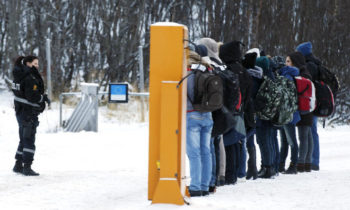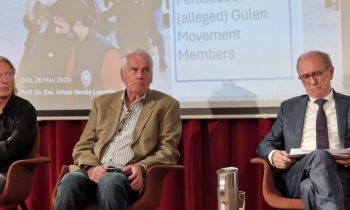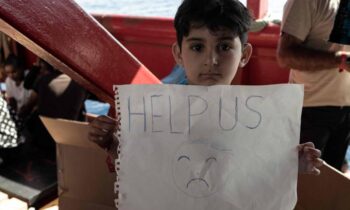 The Norwegian parliament has adopted a number of legislative amendments to ensure a more sustainable asylum policy and strengthen border control. These were approved by the King in Council today. The Ministry is now considering the need for transitional rules and regulations for the period until the amendments come into force.
The Norwegian parliament has adopted a number of legislative amendments to ensure a more sustainable asylum policy and strengthen border control. These were approved by the King in Council today. The Ministry is now considering the need for transitional rules and regulations for the period until the amendments come into force.
– The proposals that have been adopted will make us better equipped to deal with a new crisis involving the arrival of large numbers of asylum seekers. A strict but fair asylum policy is important if we are to succeed in integrating the applicants who are eligible for a residence permit and will be allowed to stay in Norway,’ said Minister of Immigration and Integration Sylvi Listhaug.
A record number of refugees and migrants arrived in Europe in 2015 and this created major challenges for both the EU and Norway. Just over 31 000 asylum seekers came to Norway, while Sweden received more than 162 000. It was against this background and the prospect of continued high numbers of asylum seekers that the Parliament reached agreement at the end of 2015 on a package of measures to significantly tighten Norway’s asylum rules.
– These amendments will enable us to deal with a situation where extraordinary numbers of asylum seekers are arriving at our borders. We are also in a stronger position to fight the use of false ID with wider authorisation of the use of fingerprinting and facial recognition technology, and the period biometric data can be stored has been extended. The Government considered it vital to introduce these measures to deal with possible new crises and the prospect of continued flows of migrants and refugees for many years ahead,’ said Ms Listhaug.
As a result of the introduction of border controls in several countries and the EU-Turkey action plan, there has been a reduction in the number of arrivals since autumn 2015.
– We saw last year that the number of arrivals can change very rapidly. The Government is maintaining a steady course in its immigration policy. We must take a long-term approach and ensure that we have a sustainable immigration policy that safeguards our welfare model for future generations,’ said Ms Listhaug.
The most important points in the legislative amendments adopted by the Storting are as follows:
It will now be possible to refuse entry to asylum seekers at the borders with other Nordic countries during a crisis with extraordinarily high numbers of arrivals.
Asylum seekers arriving in Norway from Russia or another Nordic country will no longer be entitled to enter the country without a visa during a crisis with extraordinarily high numbers of arrivals, if they belong to the category whose applications may be refused individual consideration. The cases to which this applies are regulated by new legislation.
The provision that it must be ‘not unreasonable’ to direct a foreign national to seek protection in another part of his or her country of origin will no longer apply. Foreign nationals do not have the right to international protection if they can obtain effective protection in another area of their home country other than the one from which they have fled (internal displacement). However, under the current provisions of the Immigration Act, foreign nationals may only be directed to internal displacement if this is ‘not unreasonable’.
The deadline for lodging an appeal following the rejection of an asylum application is to be reduced from three weeks to one week for asylum seekers who do not meet the conditions for being granted protection or are otherwise protected from return.
A decision to refuse individual consideration of an asylum application (for example because the asylum seeker has been granted asylum or protection in another country) may be implemented immediately if it is clear that there are grounds for this.
It is now possible to expel foreign nationals in cases where an asylum application is refused individual consideration and also represents misuse of the asylum system.
Amendments providing wider authorisation for the collection and storage of biometric personal data in the form of facial images and fingerprints in immigration cases have been adopted. The purpose is to improve checks of the identity of foreign nationals.
A new provision will make it possible to refuse certain applications for family reunification in cases where the sponsor has been granted subsidiary protection in Norway. Residence for family members may be refused if the family in question*** would be able to live safely in a third country with which the family’s overall connection is stronger than its connection with Norway. This provision does not apply if the sponsor has been granted permanent residence in Norway.
A requirement that both parties must be at least 24 years old is being introduced in family establishment cases. The purpose of this requirement is to combat forced marriage. Exemptions may be made from this requirement if it is clear that the marriage or cohabiting relationship has been entered into voluntarily.
New criteria to ensure integration are being introduced for permanent residence in Norway. One requirement is that the foreign national must have been self-supporting in the preceding twelve-month period. Applicants to whom the obligation to participate in Norwegian language and social studies tuition applies must also have a minimum level of spoken Norwegian and pass a test in social studies in a language they understand.
The obligation to participate in Norwegian language and social studies tuition is being extended to foreign nationals between 55 and 67 years of age, which means that this group must also take the tests when they have completed tuition.
The immigration authorities will be able to refuse an application for permanent residence if this would conflict with serious considerations relating to the regulation of immigration, for example if the foreign national in question has actively obstructed attempts to clarify his or her identity since arriving in Norway.
It has been decided that foreign nationals who are granted collective protection after a mass flight will not be eligible for permanent residence until they have been in Norway for six years. Until now they have been able to obtain permanent residence after four years.
(mfa)



